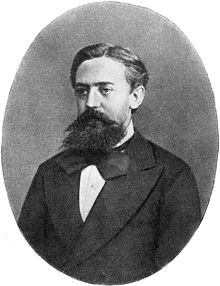Andrey Markov
| Andrei Andreyevich Markov | |
|---|---|
 |
|
| Born |
14 June 1856 N.S. Ryazan, Russian Empire |
| Died | 20 July 1922 (aged 66) Petrograd, Russian SFSR |
| Residence | Russia |
| Nationality | Russian |
| Fields | Mathematician |
| Institutions | St. Petersburg University |
| Alma mater | St. Petersburg University |
| Doctoral advisor | Pafnuty Chebyshev |
| Doctoral students | |
| Known for | Markov chains; Markov processes; |
Andrey (Andrei) Andreyevich Markov (Russian: Андре́й Андре́евич Ма́рков, in older works also spelled Markoff) (14 June 1856 N.S. – 20 July 1922) was a Russian mathematician. He is best known for his work on . A primary subject of his research later became known as Markov chains and Markov processes.
Markov and his younger brother Vladimir Andreevich Markov (1871–1897) proved Markov brothers' inequality. His son, another Andrei Andreevich Markov (1903–1979), was also a notable mathematician, making contributions to constructive mathematics and recursive function theory.
Andrey Markov was born on the 14th of June 1856 in Russia. He attend Petersburg Grammar, he was seen as a rebellious student by a select few teachers. In his academics he performed poorly in most subjects other than mathematics (which later became his profession). Later in life he attended Petersburg University and was lectured by Pafnuty Chebyshev. Among his teachers were Yulian Sokhotski (differential calculus, higher algebra), Konstantin Posse (analytic geometry), Yegor Zolotarev (integral calculus), Pafnuty Chebyshev (number theory and probability theory), Aleksandr Korkin (ordinary and partial differential equations), Mikhail Okatov (mechanism theory), Osip Somov (mechanics), and Nikolai Budaev (descriptive and higher geometry). He completed his studies at the University and was later asked if he would like to stay and have a career as a Mathematician. He later taught at high schools and continued his own mathematical studies. In this time he found a practical use for his mathematical skills. He figured out that he could use chains to model the alliteration of vowels and consonants in Russian literature. He also contributed to many other mathematical aspects in his time. He died at age 66 on the 20th of July 1922.
...
Wikipedia
